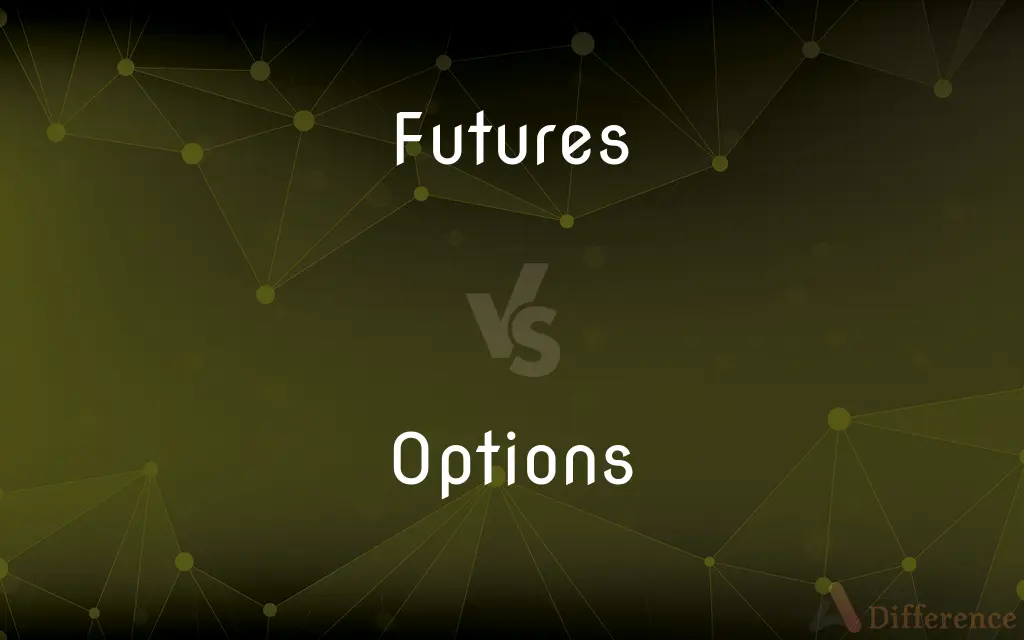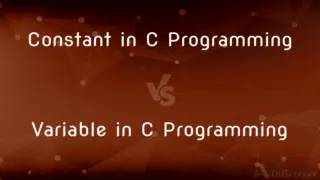Futures vs. Options — What's the Difference?
Edited by Tayyaba Rehman — By Fiza Rafique — Published on December 13, 2023
Futures are contractual obligations to buy/sell at a set price; Options grant the right, not obligation, to buy/sell at a set price.

Difference Between Futures and Options
Table of Contents
ADVERTISEMENT
Key Differences
Futures are standardized contracts that obligate two parties to exchange a specified asset at a predetermined price on a specified future date. Options, on the other hand, give the holder the right but not the obligation to buy or sell an underlying asset at a specified price before or on a certain date.
In the world of Futures, the buyer is obligated to purchase and the seller is obligated to sell the underlying asset at the set price, regardless of the current market price. In the realm of Options, the buyer pays a premium to the seller (or writer) of the option for this right, and the seller is obligated to honor the contract only if the buyer chooses to exercise the option.
The primary difference between Futures and Options is the risk and obligations associated with them. With Futures, both parties face potential unlimited risk, whereas with Options, the buyer's risk is limited to the premium paid while the seller's risk can be higher.
Another distinction is the upfront cost. Futures often require an initial margin deposit, which is a fraction of the contract's value. Options buyers must pay a premium, which is the cost of obtaining the right to buy or sell the underlying asset.
Lastly, Futures contracts are typically settled either by physical delivery of the asset or cash settlement. Options can be settled in various ways, including cash settlement or by exercising the option and then dealing with the underlying asset.
ADVERTISEMENT
Comparison Chart
Contract Nature
Obligation to buy/sell.
Right, not obligation, to buy/sell.
Risk
Both parties face potential unlimited risk.
Buyers: limited to premium. Sellers: can be high
Upfront Cost
Initial margin deposit required.
Premium paid by the buyer.
Settlement
Physical delivery or cash settlement.
Cash or exercising the option.
Flexibility
Less flexible; bound by obligation.
More flexible; dependent on the holder's choice.
Compare with Definitions
Futures
Standardized contracts for asset exchange at a predetermined price/date.
The farmer entered a Futures contract to sell his grain in December.
Options
Contracts offering the right, not the obligation, to buy/sell assets.
He bought call Options expecting the stock to rise.
Futures
Financial instruments traded on futures exchanges.
She trades Futures to hedge her company's risk.
Options
Derivative instruments with a premium cost.
She paid a premium for her Options contract.
Futures
Contracts outlining specific delivery details and pricing.
Oil Futures saw a spike due to geopolitical tensions.
Options
Financial tools providing strategic investment opportunities.
Options can be used for both hedging and speculation.
Futures
The indefinite time yet to come
Will try to do better in the future.
Options
Contracts specifying a strike price and expiration date.
The Options expire next month at a $50 strike.
Futures
Something that will happen in time to come
"The future comes apace" (Shakespeare).
Options
The act of choosing; choice
Her option was to quit school and start her own business.
Futures
A prospective or expected condition, especially one considered with regard to growth, advancement, or development
A business with no future.
Options
The power or freedom to choose
We have the option of driving or taking the train.
Futures
Often futures A financial instrument that obligates the holder to buy or sell an asset at a set price on a specified date in the future
A market for copper futures.
Options
The right, usually obtained for a fee, to buy or sell an asset within a specified time at a set price.
Futures
The form of a verb used in speaking of action that has not yet occurred or of states not yet in existence.
Options
A contract or financial instrument granting such a right
A stock option.
Futures
A verb form in the future tense.
Options
The right to make a movie adaptation of a literary work or play
A movie studio that purchased an option on a book.
Futures
That is to be or to come; of or existing in later time.
Options
(Baseball) The right of a major-league team to transfer a player to a minor-league team while being able to recall the player within a specified period.
Futures
Agreements binding both buyer and seller to their terms.
Futures contracts help stabilize market volatility.
Options
Something chosen or available as a choice.
Futures
Derivative products based on underlying assets.
Gold Futures are popular among precious metal investors.
Options
An item or feature that may be chosen to replace or enhance standard equipment, as in a car.
Options
(Football) An offensive play in which a back, usually the quarterback, decides during the play whether to run with the ball, throw a pass, or make a lateral, depending on the actions of the defense.
Options
To acquire or grant an option on
"had optioned for a film several short stories about two policemen" (Barbara Goldsmith).
Options
(Baseball) To transfer (a major-league player) to a minor-league club on option.
Options
Plural of option
Options
Instruments giving the holder decision-making power.
With Options, he can choose whether to exercise or not.
Common Curiosities
What are Options?
Options grant the holder the right, not the obligation, to buy/sell assets at a predetermined price.
How are Futures and Options similar?
Both are derivatives based on underlying assets, used for hedging or speculating.
Can you exit Futures contracts before expiration?
Yes, most Futures contracts are closed before expiration by entering an offsetting position.
Are Futures more risky than Options?
Both have risks; however, Futures obligate both parties, while Options limit buyer's risk to the premium.
What is the premium in Options?
The premium in Options is the price paid by the buyer to the seller for the right to buy/sell.
Can Options be sold before expiration?
Yes, Options can be bought or sold before their expiration date.
What's a call option in Options?
In Options, a call option gives the holder the right to buy the underlying asset at a specified price.
What are Futures?
Futures are contracts obligating parties to buy/sell assets at a set price on a specific date.
Do Options have an expiration date like Futures?
Yes, both Options and Futures have specified expiration dates.
How are profits made in Options?
In Options, profits can be made through price movements, changes in volatility, or time decay, depending on the strategy.
Do all Futures end in the physical delivery of assets?
No, many Futures contracts are cash-settled, while others involve physical delivery.
How do Futures help in hedging?
Futures allow entities to lock in prices, protecting against adverse price movements.
Can I lose more than I invest with Options?
Options buyers can lose only the premium, but sellers can face higher losses.
Is there a cost to enter a Futures contract?
Yes, Futures often require an initial margin deposit based on a percentage of the contract's value.
Why would one prefer Options over Futures?
Options offer more flexibility and can limit potential losses for buyers, while Futures bind both parties.
Share Your Discovery

Previous Comparison
Constant in C Programming vs. Variable in C Programming
Next Comparison
Verilog vs. VHDLAuthor Spotlight
Written by
Fiza RafiqueFiza Rafique is a skilled content writer at AskDifference.com, where she meticulously refines and enhances written pieces. Drawing from her vast editorial expertise, Fiza ensures clarity, accuracy, and precision in every article. Passionate about language, she continually seeks to elevate the quality of content for readers worldwide.
Edited by
Tayyaba RehmanTayyaba Rehman is a distinguished writer, currently serving as a primary contributor to askdifference.com. As a researcher in semantics and etymology, Tayyaba's passion for the complexity of languages and their distinctions has found a perfect home on the platform. Tayyaba delves into the intricacies of language, distinguishing between commonly confused words and phrases, thereby providing clarity for readers worldwide.












































